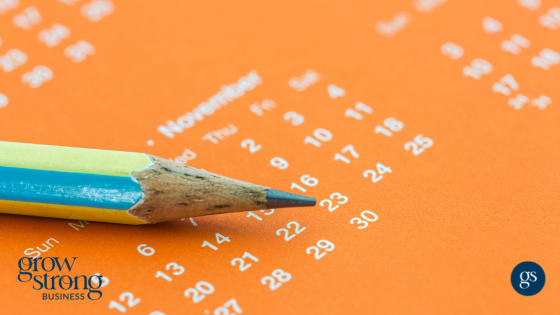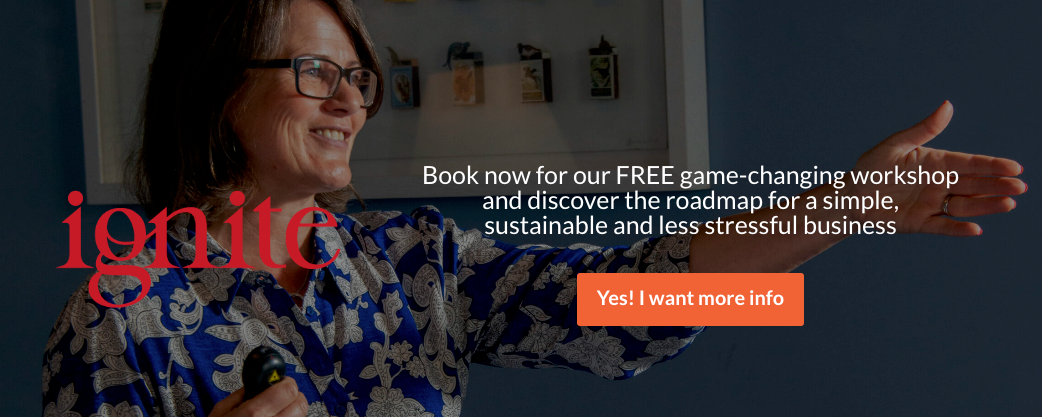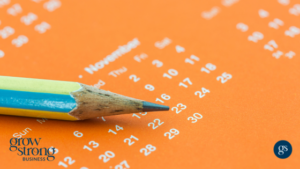Have you ever considered the timings of your monthly cycle when planning your business or deciding when to launch your next programme or speak at an event?
(Yes, this article is written for women, but if you’re a guy with women in your team, please read on because this is a serious post and can be incredibly enlightening if you’ve never considered this in your business!)
Cycle tracking is becoming an everyday conversation, at least with our clients.
It’s one of the ways you can track how your energy flows naturally and responds to external influences, such as what food we eat and how we look after our bodies, and since doing a lot of research in this area and bringing it into the work that we do with our clients, I’ve seen that creating sustainable business success is more than a well-put-together business plan or marketing funnel.
Being aware of what affects your energy and how you approach certain decisions in your business can help you design, create and run your business so your work fuels you rather than burns you out.
Why track your monthly cycle?
If you’ve ever tracked your cycle, you’ll know your energies have ebbs and flows.
I’m now post-menopausal, so I no longer have a monthly cycle; I tune into different things to track my energy flow now. But in the last few years of menstruating, I tracked my cycle to help plan my marketing campaigns and promotional events as it became a helpful barometer to tune into my ebb and flow of emotions, creativity and periodic stuck-ness.
I started to be aware of the exact dates of my cycle when my husband and I decided to start a family (ah, those fun days of taking one’s temperature to confirm ovulation days!). But it wasn’t until my adrenaline reached boiling point and my system crashed back in 2012 that I started seriously to research my peri-menopausal symptoms. I began to track my monthly cycles again.
Tracking my emotional and physical changes throughout the month helped me make sense of what was going on inside of me; the feeling of being out of control one week focused and in flow the next, often followed by a severe energy crash, irrational mood swings and my inner critic shouting down any great ideas I had for my business.
In my experience, knowing where I’ve been in my cycle at any given point in my working week has helped me enormously over the past few years to deal with things that haven’t gone according to plan … as well as helping me realise I wasn’t going mad; I’m simply a woman!
The four stages of your cycle
Your cycle has four distinct stages, each affecting your energy, emotions and physicality.
Of course, not every woman has a regular 28-day cycle; we all have our unique pattern, sometimes so irregular that it’s hard to track. But if you are still in menstrual flow, the first step in taking this approach with your business is to track and record how you feel and what symptoms you experience.
Plenty of apps to choose from today include tracking your symptoms and moods, too.
If you prefer a ‘paper’ version, I have a brilliant 28 Day Energy Tracker here that you can download for free.
Phase 1: Menstruation
Day 1 of your cycle is the first day of menses. I often found a massive sense of relief on this day, followed by a few days of general yuckiness, bloating and tiredness that worsened as I got older. It felt as if my body found it tougher each month to kick start the engine as I get closer to menopause each year.
Day 2 or 3 was a day I could have quite happily stayed in bed all day, and although walking and getting out and about brought relief, it was always vital for me to lower my pace and keep rested. I learnt from experience that to go full pelt during these days would have a knock-on effect of being knackered for weeks or even picking up a bug and getting ill. So, instead of pushing through with complex tasks, I leant back and took everything at a slower pace during these times. When I did this, it often turned out to be an incredibly productive time for me, as I pondered more, avoided making decisions and focused on creative projects such as writing, content and programme design.
Phase 2: Follicular
This phase usually lasts 7 to 10 days of your cycle, and it’s when your oestrogen and testosterone levels start to climb, getting you ready for ovulation.
I used to feel wonderful during this time, but as my peri-menopausal symptoms kicked in, the lack of oestrogen made this week tough for me for some months. It was often when I felt the most frustrated; I’d been used to surging ahead with plans and action-taking with my brain going full steam, but my body did not respond in this way in my last few years. And if I’d pushed through in my menstruation phase, I would feel a bit shit during this time!
Phase 3: Ovulatory
Lasting only a few days, your body produces your egg, and you may feel incredibly powerful; able to take on the world and say yes to everything.
It’s Mother Nature’s way of making you attractive to the opposite sex and ready to mate, of course, so this can be a fabulous time to run an event, negotiate with a new contract or even pick up the phone to prospect you’ve been putting off for an age.
Phase 4: Luteal
Typically lasting 12 to 16 days, this is the remainder of your cycle. Oestrogen and testosterone decline, and progesterone, the heat-inducing hormone, kicks in, preparing your body for a potential pregnancy. Often, you feel the most tired because Mother Nature is preparing you for ‘rest and nest’.
This phase can become an excellent time to brain dump to-do lists, clear up clutter and re-align yourself before taking action on any new projects or ideas.
And, of course, PMS can start to kick in towards the end of this last stage; from chronic back pain and stiff joints to raging anger and mood swings. So be aware that this can be a particularly stressful time to think straight or do projects such as the end-of-month accounting! So perhaps it is not the best time to reconcile your banking or respond to a negative comment on one of your Facebook posts.
What about you?
Every woman’s monthly cycle is unique to her. You will have your own symptoms and experiences; and some months go better than others. But the more aware you become of your cycle, the more effective and productive you can be in your business decisions and marketing activities.
And as marketing can be such an emotive part of your business, from deciding what price to sell at and whether to record a live video when all you want to do is climb into bed with a hot water bottle, here are some of the lessons I have learnt along the way of planning my marketing and my business around my cycles.
Lessons learnt from tracking my cycle
1. Stop beating yourself up
You can stop beating yourself up when you get frustrated something’s not working.
Being “on your period” is not about making excuses but when you are aware of how your body is responding to which hormones you are producing, it can clarify why you may be screaming at your laptop for deleting your file (because, quite obviously, it had nothing to do with you!).
2. Give yourself a break when you need it
You can give yourself a break when your body needs it most and plan to deliver your best work when you are at your best.
Planning a two-day event in the fourth week of your cycle may not the best time if you’re contending with stomach cramps and irritability so if you have control over your work calendar, choosing days in your follicular weeks could allow you to rock your best work in front of an audience.
3. Stop taking yourself so seriously
Nothing … and NOTHING … is more irritating than someone (AKA your partner) asking you if you’re PMSing … when you are PMSing.
I would often head this off at the pass once I became aware of my mood swings. When I got that first sign of irritability, I was off to check my period tracker, and then tell my husband and my children that I was on the way. I found that I could laugh about it if I were the one to bring it up first … funny how that happens!
4. Take days off when you need them
Running your own business gives you the enormous benefit of controlling your diary, so don’t make it more difficult for you or your team members than it needs to be. If you have a particularly bad PMS or find it tough on other days of your cycle, factor those days into your working calendar. Your body and brain will thank you for it when you come to your productive days, and you can turn up the energy dial.
In corporate life, taking a sick day for bad period pains can be challenging to negotiate, especially if it’s as regular as clockwork and it’s the same day of every month. Plus, trying to explain in a board meeting why your brain fog is so thick and why you have no idea why your sales figures are down this month may not go down well. However, I remember one lady who worked as a Communications Director for a small company. She began to add her cycle in her work diary after a conversation with me about his topic so she and her team could see her predicted cycle. This may be one step too far for you, but I believe the more we normalise our normal cycles as women, the better support we can get from others.
5. Get braver on your brave days
This was a game-changer for me!
Add this cycle time to your diary if you know you’re raring to go during your follicular week. Plan your sales days during this time. Or your business planning or creation of a new programme. Let Mother Nature help capitalise on these days and help you do your best work.
Making periods part of the business conversation
This topic of periods and hormonal cycles is incredibly important, and although it is easier to bring this topic up than it was a decade ago, I wish more people, men and women, could discuss this in the context of business.
As we grow into a more feminine world and more female leaders rise to the top, this topic must be discussed openly to enable us to develop and grow our businesses without burning out.
If there is one thing I’d love you to take action from reading this article, if you don’t already, it is that you start to track your cycle.
It can be as simple as writing in a journal, or if you prefer a piece of tech, then there are plenty of period tracker apps you can get for your phone (you get the added benefit of the apps automatically calculating your future due dates based on your cycle dates).
Or download my free 28 Day Energy Tracker.
Self-awareness is powerful; gathering evidence, rather than wondering what is going on with your energy roller coaster, can give you specific patterns to look out for and help you plan your marketing WITH your menstrual cycle rather than run your business against your natural ebb and flow.
For those who already track your cycle, I’d love to know what you do in your business and marketing plans to consider where you are during the weeks.
Leave a comment below. Do you plan your business around your dates already? Or has this article made you think about how you could?

POST EDIT: Originally published 17th January 2009. Updated and republished 5th March 2024.









This is so interesting Karen. I’m going to start tracking my cycle in terms of how I’m feeling and plan my work around it and stop giving myself a hard time on the days when I’m unfocused and lethargic. Thanks for sharing 🙂
Once you know what’s going on for you on the inside Helen, the outside makes so much more sense. It’s been an eye opener for me, that’s for sure!
Thanks for this Karen, I never considered making the connection between menstrual cycles and my (and my female clients?) productivity before, but it does make absolute sense.
Thanks for this detailed explanation Karen. There’s always a week in the month where I’m short and snappish and the advantage of a home based biz means you don’t actually have to talk to people that week! I’m finding as I’m getting older that snappy week is also the more tired week. I need to do more planning and keep better track of things
Hello Everyone. Thank you Karen this is really interesting. It’s great to understand our cycles and fluctuations in energy etc. and work with them rather than against them. But I feel it is also very important to stress that we should educate all girls and women to recognise that when these fluctuations become problematic and affect our well being it may be common, but is definitely not natural. It is due to a hormonal imbalance and women do not need to accept it and suffer through it quite as much as we are led to believe. There are many things such as diet, exercise and complementary therapies that can make our passing through the monthly cycle (and menopause) a natural harmonious process rather than something to be endured. Many women don’t suffer during either and I think it’s something we can all aim for rather than just accepting its a woman’s lot: it is not.
Thanks so much for your input Angela. As someone who’s been greatly affected by peri-menopausal symptoms and hormones over the past few years, I know what a difference it has made finding the right supplements, diet and exercise to rebalance myself. Let’s keep these topics going – for all ages and both genders!
Over the last year I have been becoming more aware of specific ebbs and flows of energy during my cycle. I now don’t book clients just before and after I’m due to bleed as this is my most tired and grumpy phase. I then find i do more creative and energetic projects just after. The main thing is I try and rest during my bleed and try not to beat myself up for not doing as much knowing that I will be more productive later in my cycle. I have found my periods have got worse as I’ve got older and I’m only 38.
Great tips and most of all – awareness. When I was contract training in Ireland years ago, my periods caused me a lot of anguish – I had no control over my training days and training for 6 hours as well as ‘lunching’ with the participants were some of the hardest days I have put down.
Now I sit in my office at home in France, doing my best work when I’m at my best, and resting when I need to on heavy days. Even though I’ve been marking my periods for years, I am now more conscious of the changes as I also approach menopause. it’s just a pity we can’t have a date or even year when we know it’s going to kick in – 38, 45, 50, 54??? Sometimes periods feel like Russian roulette!!